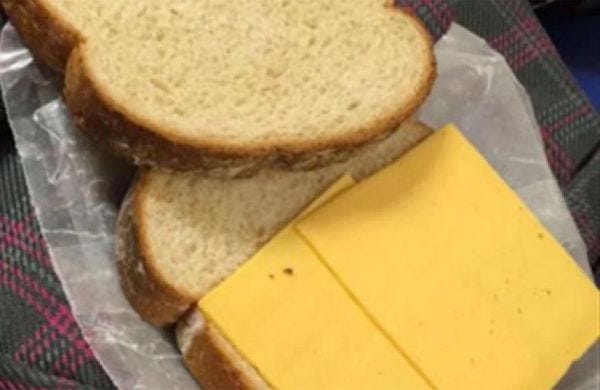Colorado Voters Give EVERYBODY Eat — At School, At Least
By raising taxes on the top 5 percent, so it's almost Eat The Rich.
Colorado voters chose Tuesday to provide free school meals to all students in the state's public schools. The ballot initiative, with the memorable name "Proposition FF" (it doesn't stand for food fight , you), has 55 percent of the vote, although technically votes are still being counted.
The initiative will create a new Healthy School Meals for All Program that will be paid for by reducing the amount of state tax deductions allowed for households with incomes over $300,000, which means more of their income will be taxable. The Denver Post explains that the new limits on deductions will affect about five percent of Colorado taxpayers , roughly 114,000 joint and single returns annually. On the upside, those families won't have to pay for their kids' cafeteria lunches anymore.
The Post notes that the new deductions limits will
hike the overall tax burden of those households by more than $800 for those with incomes of $300,000 to $499,000, and round up to an average of more than $1,150 for those with $1 million or more in annual income.
My goodness, how will they live???
NPR explains that the measure will make up for the end of the federal school lunch program that provided universal school meals during the pandemic; Democrats' efforts to make that program permanent — or even to extend it for one more year — were kiboshed by Mitch McConnell, the gross old turtle. Not everyone can subsist on a diet of iceberg lettuce and meal worms, you jerk.
Since the federal program ended, Massachusetts, Vermont, and Nevada have all extended universal school meals for at least a year. Maine and California have passed permanent universal school meal funding similar to Colorado's new law, and several other states have bills in process that would also provide universal free meals.
Supporters of Proposition FF (not for French Fries either, it's just an arbitrary designation) said there are some 70,000 Colorado kids who can't afford school meals but don't qualify for free or reduced-price school meals.
"I believe every kid should eat, no matter what income their parents have," said Maria Olvera, a voter and mother of a school-age daughter in Westminster, noting food is getting pretty expensive.
"No kid should be left behind," she said.
And now we have found an instance of the phrase No Child left Behind that we can support.
Ashley Wheeland, of Hunger Free Colorado, called the initiative's success "a massive victory for hungry children," adding that not only would it help to reduce food insecurity in Colorado, but also that it would put an end to "lunch shaming" for kids whose parents fall behind on school lunch bills. No more "cheese sandwich of shame" or those horrible public humiliations where kids get a PAY YOUR LUNCH BILL stamp on their hands, to make the kid feel horrible about their parents being poor.
In addition to providing meals to all students, the funds from the tax measure will also be used to increase cafeteria worker's salaries, which may help with recruiting workers in understaffed schools. Damn, it's like Colorado nonprofits, anti-hunger advocates, and school support workers' unions thought this stuff through in drafting the initiative!
There wasn't any organized opposition to the initiative, which certainly helped, although The Usual Assholes voiced concerns that maybe if children are given access to good food at school, a necessity for effective learning, they might get lazy and expect handouts for everything instead of getting jobs in a factory like good responsible eight-year-olds should.
Jon Caldara, president of Denver-based libertarian think tank Independence Institute, called the proposition “wrong” in many ways.
While he concedes that children from low-income families “should have help,” Caldara argues that the current system already serves those kids free or reduced-cost meals, on top of support from food banks, county and city programs and the Supplemental Nutrition Assistance Program, or SNAP.
The proposition instead “taxes rich families to buy lunches for other rich families,” Caldara wrote in an emailed statement. “Middle, upper and high income families shouldn’t be put on the dole.”
He pointed to one potential consequence as “encouraging wealthy families to stop giving to charity” since tax deductions, including charitable deductions, are limited.
The Denver Post didn't say whether Caldara asked whether the workhouses and prisons are adequately funded, which seems like quite a journalistic oversight the end.
OPEN THREAD.
[ NPR / Denver Post / NPR / Image: Today Show ]
Yr Wonkette is funded entirely by reader donations. If you can, please give $5 or $10 a month so we can keep bringing you the Nice Time stories from this election — and keep agitating for 'em in future elections.
Do your Amazon shopping through this link, because reasons .




She's got a real hard decision to make now - keep kissing Trump's ass, or switch over to DeSantis's ass.
I didn't lay in any popcorn for the midterms, because I thought it was a foregone conclusion. How wrong I was!